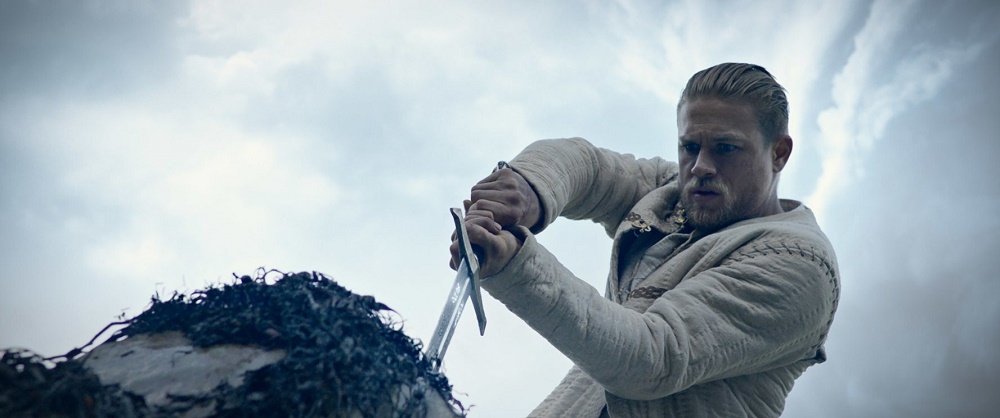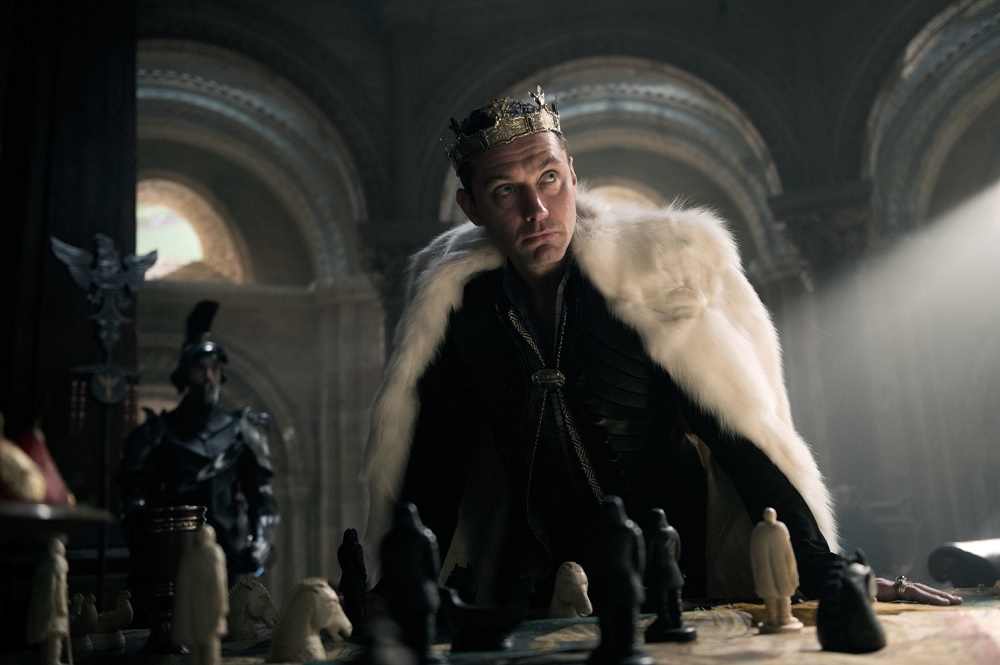There is something about the legend of King Arthur that has compelled audiences to dive into the story of the born king for millennia. Yet, there has never been an Arthurian tale told quite like what audiences are getting in the form of Guy Ritchie’s King Arthur: Legend of the Sword.
Ritchie (Snatch, Sherlock Holmes) has a unique filmmaking style that when you see a movie that is his; you keenly know who is behind the camera. For a tale that is as old as tales that have been told, it is refreshing to witness someone like Ritchie take a stab at the story of the fated foil of the evil Vortigern (Jude Law) and how his pulling of the sword Excalibur from a stone would mean that England had a new leader and it is not the one ruling over it.
Ritchie’s penchant for kinetic action sequences, coupled with the age-old lore should add up to something terribly unique and totally thrilling. It does on so many levels.
First of all, it is so rare that audiences have been able to go deep into the legend and discover over a two-hour spell exactly how this pauper became a prince (well, king). It is also fascinating to get an in-depth look at this boy — who was orphaned when his father, King Uther (Eric Bana), was murdered by Vortigern in a violent coup to grab power — developed and became a man. Who taught him the ways of the world? How did his humble upbringing in a brothel produce his demeanor that made him not only a champion of the commoner, but beloved by the people who would comprise his kingdom?
What else is illustrated by Ritchie is Arthur becoming battle ready for the violent challenges that he would face on his destiny-laden road from London streets to Camelot residing ruler. These are all elements that add up to the Arthurian legend we all know and love. King Arthur is a commanding figure who the public adored. He also has the respect of those who would become his Knights of the Round Table. What we adore so much about King Arthur: Legend of the Sword is that there is no fully formed Round Table by the time this story closes. But we do know who is likely to fill out its membership and why these souls would give their life to this man who was raised by prostitutes and yet commands loyalty. This is a man, after all, who is just as regal as anyone who spent their life in a castle being trained to lead.
It was a stroke of genius to cast Charlie Hunnam in the titular part. The Sons of Anarchy vet (also now appearing in the stunning The Lost City of Z), like Arthur, was also fated to be in this position. He was born to rise to this role. Hunnam shows sides of his talent that we have never seen prior. He is vulnerable. He is driven. His command of what’s right and wrong, and most importantly why it is, is firmly established. Previous versions we’ve seen on screen have not quite been up to speed in this department. For that, we salute Ritchie and his three other co-story weavers.
Law is devilish as our villain and his motivation for doing what he does is also firmly laid out in the first act, so that when we have our clash of villain versus hero, it is not only satisfying, but feels like a true fulfillment of a prophecy. The actor has truly come into his own in the last several years and his villainy is vivacious in its desperation to grab, and keep, power.
Other elements too get an upgrade and update. The costumes and score give a feel that is firmly Arthurian, but yet still modern and relatable to today’s audiences. What composer Daniel Pemberton does is remarkable. He uses instruments, such as the cello, that were around during Arthurian times, yet they are electrified in such a manner that feels as if they could be heard emanating through the speakers of today’s rock concert landscape. It is a haunting and heart-pulling musical accompaniment to the action, drama and emotional pull of what is occurring on the screen. The costumes by Annie Symons are firmly sixth or seventh century, while still feeling like this is not an Arthurian tale being dragged down by being dated.
Ritchie is evolving as a filmmaker. Sure, he still employs his trademark cinematic moments, such as showing his characters hatching a plan and then showing us how it will play out before it happens. But, he continues to surprise as well. There are moments in King Arthur: Legend of the Sword that feel fresh and not repeats from the Ritchie school of cinematic shock and awe.
The film is not perfect, although it is an utter joy to witness and will grab you from its opening coda through its closing crescendo. There is a bit of muddling in the second act that keeps it from being a bump-less journey to Camelot. But, what it does do is leave so much of the Arthurian legend subtlety out of the picture… therefore having the audience subconsciously feel that there is much more of a tale to tell.
In fact, there is a large chunk of the Arthur story to come. Let’s hope King Arthur: Legend of the Sword gets enough audience attention to warrant Hunnam, Ritchie and their band of merry men to continue this modernized — yet still firmly steeped in the classic — tale moving forward.
Grade: B



